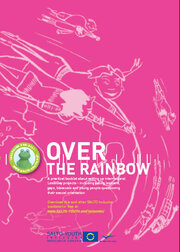Specifics for LesBiGay Projects in different Counties
- Find this and more in the SALTO Inclusion for All booklet: Over the Rainbow
- Besides the specifics of LesBiGay projects below, you can find inspiration for your programme of activities in the SALTO Toolbox for Youth Work and Training at www.SALTO-YOUTH.net/Toolbox/: get-to-know games, simulation games, group methods, energisers, exercises addressing social in/exclusion and discrimination,...
Specifics of the host country
Different realities
Europe is a mosaic of differences and commonalities. When you plan an activity in a different country it is necessary to be aware of the specificities and realities of the host country. In some countries, being gay, lesbian or bisexual can still be a very difficult life to lead. European legislation makes discrimination based on gender and sexual orientation illegal, but many governments and especially people's mentalities have not always evolved in the same direction. It is important to get a feel for the situation in the host country, about what is possible, what the risks are and how you can best deal with them.
If the situation in the host country is less favourable for LesBiGay people than in your own country, you will need to prepare your group accordingly, especially when in public places. To counterbalance this you may need to create a form of safe haven for your participants where they can be themselves more freely (e.g. by using a gay friendly hotel, going to gay bars, etc.). It might not appeal to you or to the members in your group to have to conceal your sexual identities, however you must take your own safety and that of your host into consideration. You may feel the need to make bold statements publicly at the beginning of the exchange in order to try to change people's views, however you should keep in mind that the host organisation will have to contend with any hostility you may have created long after you have returned home.
If, on the other hand, the host country is very open-minded regarding LesBiGay issues, you will also have to prepare your participants for this. Some participants might not want to show their homosexuality openly, they might be reluctant to participate in public events (parades, media coverage, etc.). As already mentioned, it is important to create a safe environment in which people feel they can participate or opt out when they wish to do so. It is important to keep this in mind when developing the programme for your project together with your partner organisation.
Another learning experience for the young participants could be the differences between LesBiGay life in the cities and rural areas. In general, people in bigger cities are more used to seeing LesBiGay people than those living in smaller villages. You will need to prepare your participants accordingly, depending on where the project takes place. If your project is organised in a big city, the young people might feel overwhelmed by the freedom and openness they witness. On the other hand, the young people might also be surprised by the ways in which LesBiGay organisations use creative ways to manage their activities in rural areas.
^^ top ^^
Creating links with the local LesBiGay community
One of the key aspects of any intercultural exchange involves learning about the local reality, and in this case in particular the local LesBiGay community. Young people participating in an international LesBiGay youth project will more than likely be interested in discovering and understanding the LesBiGay milieu. One way of doing this could be to organise activities together with the local community, organise meetings with some of the organisations or participate in some of their events (e.g. film evening, nature walk, creative workshops, etc.).
Be aware, however, that the arrival of a large group of LesBiGay people might have an overwhelming impact on a small organisation or community. The people participating in the exchange programme might have less inhibitions as a result of being away from home, but the partner organisations and their members might not share the same feeling. Therefore, it is important to give the hosts enough information about who is coming and what the aim of the project is, so that the organisations that you visit are well prepared and know what to expect, as well as that which they could see themselves offering.
Similarly, as football fans enjoy meeting other football fans when abroad at a match, LesBiGay people appreciate visiting and participating in the "lesbian and gay scene". It will depend of course on the age of the participants whether this can be allowed or not during your exchange. You could, for example, organise a party in one of the local bars/clubs.
The LesBiGay scene itself can vary greatly between different countries and cities, which is one of the attractions of it. It could also be a reason to prepare participants for what they will find, especially if visiting some dubious or dangerous clubs/pubs, e.g. some bars might be well-known for drug use, others could be sex-oriented, or there could be a danger of attacks on homosexuals in certain areas. Your local partner organisation can probably advise you on which places are best avoided.
If there is a lively nightlife in the town or city there is always a possibility that your participants might head out on the town regularly and perhaps show up later or less often for your daily work sessions. Keep this in mind during the preparation of the project, and come to an agreement with the young people involved on the hours that they should be present working on the project and on how much free time they will be allowed. It is always wise to have a healthy balance.
^^ top ^^
Taking to the streets
During the course of a youth exchange or international activity, occasions can arise when the participants might want to react, via a demonstration or other action, to homophobic remarks or actions faced by the local LesBiGay community. More often than not, religious groups, political groups or other social players publicly express their discontent at having their city welcome events of this kind. It can also happen that the young people who are being hosted in the city will come face-to-face with discrimination and intolerance during their stay and may wish to respond. These protests are often spontaneous and passionate rather than well thought through.
Before taking to the streets, however, it is extremely vital to check what the legal provisions governing public demonstrations are in order to avoid or limit the potential legal risks faced by individuals or the organisations involved. In some countries, certain public spaces cannot be used for demonstration purposes without the approval of the local authority (e.g. squares, streets close to embassies or local councils). In other countries, those who are underage are not allowed to be on the streets during certain periods and cannot participate in demonstrations without parental approval. At other times, the organisations who organise the demonstrations are solely responsible for any damage that might occur.
- Better safe than sorry! There may exist alternative ways to channel your requirements or frustrations. Take a look at Making the most of LesBiGay projects.
^^ top ^^
Intercultural LesBiGay learning
One of the most exciting things about international projects is the discovery of new countries and cultures, witnessing that there are different ways to respond to certain situations, e.g. different habits, customs, values, ways of interacting. This can put your own way of doing things in perspective and equips you with intercultural skills that make it easier to deal with differences or to look at things from a different angle. Intercultural learning is the process of acquiring knowledge, skills and attitudes that are essential in order to be able to function in a multicultural environment.
You can stimulate intercultural learning in your project in a variety of ways. During the preparation phase of your project you could ask the participants to find information about the other countries or cultures involved. They can remain on the surface by finding information on food, music, dress, etc., or they can delve deeper by finding more information on people's values, political views, taboos, interactions, etc. They can use the Internet to locate information or by contacting the other group(s).
During the exchange itself, it is important to schedule activities in which participants get a chance to show off their respective cultures. This could be in the form of an intercultural evening where the different countries present local food, drink, dance, games, costumes, etc. The participants also have the possibility of seeing each other react in a variety of situations by mixing young people from different countries in working groups, in shared bedrooms, at the dinner table, etc. Their behaviour in these everyday situations could be the same or differ slightly. It is important that the youth workers provide a space for reflection, either in national or mixed groups, to share and come to terms with the cultural differences. It is especially important, when the participants are experiencing a feeling of culture shock (i.e. not knowing how to interact with people from another culture), that they are given a chance to release any pent-up emotions and to restructure their thoughts in a positive way. This conscious effort of reflecting is an essential step toward productive intercultural learning, as it provides a basis for discussion and exchange beyond anecdotal or cosmetic facts.
- You can find out more about intercultural learning in the Training-Kit on Intercultural Learning www.training-youth.net and there are a variety of intercultural learning exercises to be found in SALTO's Toolbox for Training www.SALTO-YOUTH.net/Toolbox/
Another interesting topic for your international LesBiGay youth project could be whether the young people from the different countries feel they have more in common with each other because of their homosexuality than they would otherwise have. Does a LesBiGay culture exist across borders? Is the fact that you are lesbian or gay enough to build a friendship on? LesBiGay encounters are definitely sources of great learning and discovery!
^^ top ^^
Downloads
The following downloads are available:
- Over the Rainbow - international LesBiGay projects - 2008 update
Inspiration & advice for setting up respectful projects with young gay lesbian bisexual people. Lots of information about project management, finding partners, funding,... Based on SALTO TC Rainbow 2005



